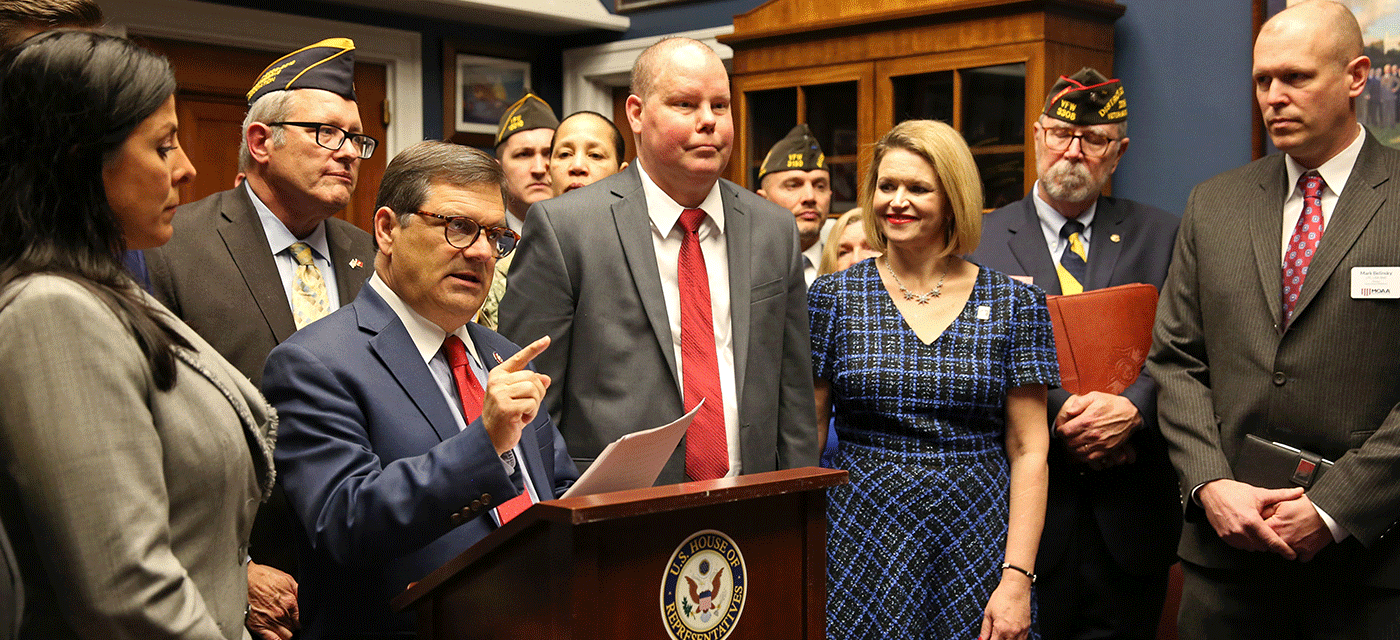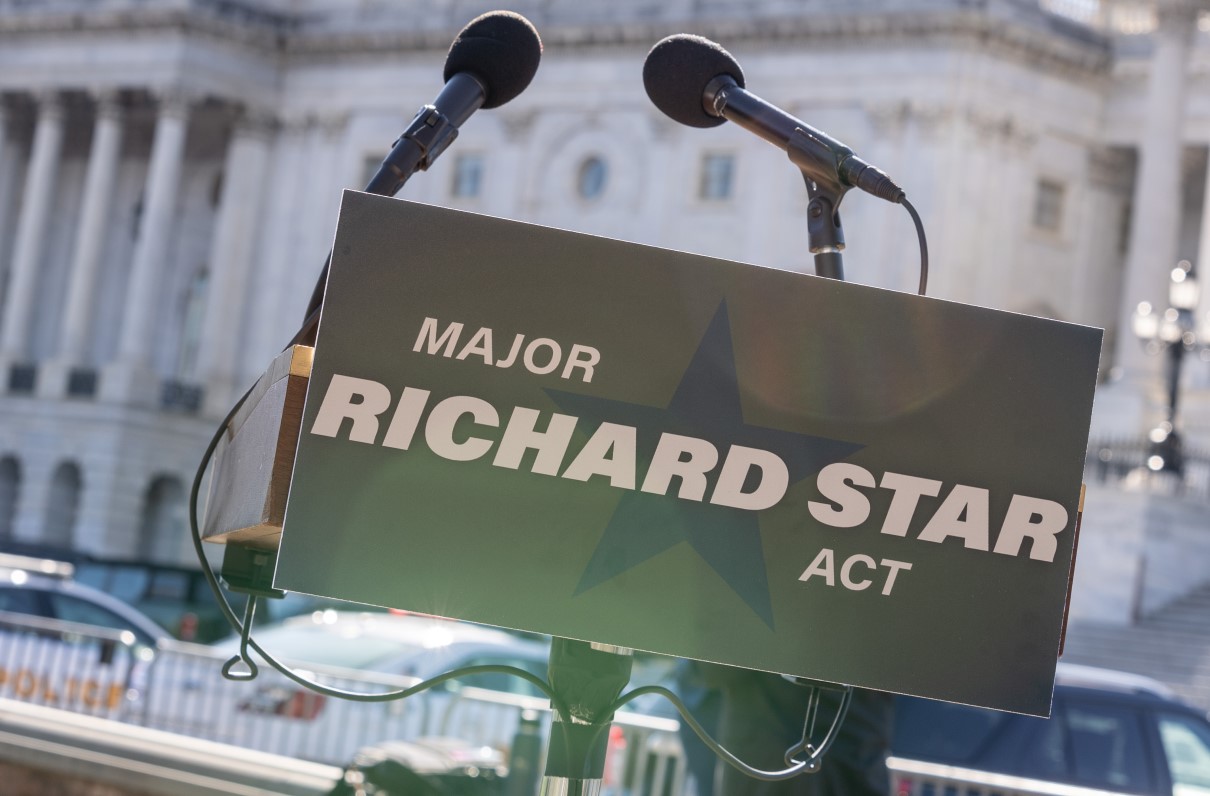Bipartisan legislation designed to end an unfair pay offset for tens of thousands of combat-injured veterans has earned overwhelming support in the last two sessions of Congress. But for the 118th Congress to include the Major Richard Star Act (H.R. 1282/S. 344) in the next National Defense Authorization Act (NDAA) – a move which would send a clear message of support to the all-volunteer force – advocates must overcome cost concerns.
[TAKE ACTION: Ask Your Lawmakers to include the Major Richard Star Act in the FY 2025 NDAA]
It sounds strange to imagine a lawmaker telling a combat-injured servicemember they are worried about “the cost” of ending an unjust pay offset. It’s a tone-deaf approach, especially from the same lawmakers using wasteful continuing resolutions and other fiscally irresponsible practices to avoid real budget solutions. If we are telling combat-injured servicemembers that our nation cannot afford to pay them for their service, we might as well shut down recruiting centers.
Star Act Talking Points: The Basics
Considering a message, or a meeting, with your lawmaker and/or key members of their staff? Here are the basics on this critical piece of legislation:
- The Major Richard Star Act will allow combat-injured veterans to receive their earned retirement pay and their disability compensation without offset.
- DoD is responsible for retired pay, and VA is responsible for disability compensation.
- These are two different payments for two different purposes.
- Reducing DoD retirement pay due to a combat injury is an injustice.
- Congress acknowledged this as an injustice in the 2004 NDAA and partially fixed it (but not for combat-injured veterans who did not reach 20 years of service).
Cost Concerns
Lawmakers who raise budgetary objections to the bill fail to consider the extraordinary sacrifice our combat-injured veterans have made. Reducing retirement pay for those injured in combat and forced to medically retire communicates an awful message to those who volunteer to serve or are considering service.
Worse yet, these lawmakers are relying on flawed calculations regarding the bill’s cost. The Congressional Budget Office (CBO) estimate for the bill ($9 billion over 10 years) does not factor in a five-year phase-in period, which would reduce costs significantly.
It also bases its figures on all 52,304 combat-injured veterans (a figure from the DoD Actuary) covered by the legislation moving from Combat-Related Special Compensation (CRSC) to Concurrent Retirement and Disability Pay (CRDP) without offset. That’s not a guarantee – of those veterans, 27,670 have 10 or more years of service and could benefit from the Star Act qualifying them for the CRDP/CRSC Open Season; others may choose to retain tax-free CRSC, resulting in no additional cost to the government.
[MARCH 6 MOAA WEBINAR: All You Need to Know (and More) About CRDP and CRSC]
Both factors will reduce the bill’s cost – a similar reduction was seen in the cost of repealing the Survivor Benefit Plan-Dependency and Indemnity Compensation (SBP-DIC) offset, better known as the “widows tax,” which included a multi-year phase-in.
Star Act Talking Points: The Cost
If your lawmaker or their staff have questions about the cost of the Major Richard Star Act, share the below information:
- DoD Actuary reports that there are 52,304-combat injured veterans who receive combat-related special compensation (CRSC) and are not eligible to receive their retired pay and VA disability pay without offset.
- 27,670 of those 52,304 veterans had 10 or more years of service and would likely benefit from the Star Act qualifying them for the existing CRDP/CRSC Open Season.
- The current CBO score of $9 billion over 10 years was an estimate for the 52,304 combat-injured veterans all choosing CRDP over CRSC. Many may choose to maintain CRSC, which is tax-free.
- The open season and a five-year phase-in significantly reduce the cost.
- As our nation faces a recruiting crisis, it is an appropriate time to demonstrate our commitment to our servicemembers by passing the Star Act.
Crossing the Finish Line
So, is there enough momentum and political will this year for this legislation to become law, overcoming any cost concerns?
There are 72 senators and 327 representatives who already co-sponsor the bill. An election year offers a chance for advocates to make a big impact, both by adding to that figure and ensuring supporters aren’t just paying lip service to the legislation – it must be a priority.
Those running for office are well aware of the ability of military and veterans service organizations (MSOs/VSOs) to rally “the troops” and impact an election. To get across the finish line, we need to push for the inclusion of the Major Richard Star Act in the base text of the FY 2025 NDAA over other funding priorities. There are a lot of voices out there, and we need yours to correct this portion of the larger concurrent receipt problem.
A Stronger Voice Through a Coalition
Support for the Major Richard Star Act is coordinated across our uniformed community. MOAA is part of The Military Coalition (TMC), a group of 35 MSOs and VSOs working together to advance legislation supporting our servicemembers, their families, retirees, veterans, and surviving spouses.
TMC has played a role in the removal of the SBP-DIC offset, as well as legislation improving VA benefits and access to care for veterans exposed to toxins while in service. Just as MOAA is asking its members to support this cause, fellow TMC members are preparing testimony and activating their own member networks.
The legislative champions for the Major Richard Star act are Sens. Jon Tester (D-Mont.) and Mike Crapo (R-Idaho), along with Reps. Gus Bilirakis (R-Fla.) and Raul Ruiz (D-Calif.).
“For generations, Americans have gone to war backed by the promise that their country would take care of them when they came home,” Tester said in support of the legislation. “But for those forced to retire from military service due to their combat-related injuries, their government is failing to deliver on that promise by denying them the full military benefits they have earned. Fixing this injustice is a necessary cost of war, and one we must pay by passing the Major Richard Star Act.
“I’m proud to lead this fight alongside Military and Veterans Service Organizations, and am pushing the Congressional Budget Office to fix their misleading calculations about the bill. The fact is, we made a promise to these men and women and I won’t back down until we get this bill signed into law.”
Bilirakis has introduced concurrent receipt legislation in every session since becoming a House member in 2006.

Rep. Gus Bilirakis (R-Fla.) announces the introduction of the Maj. Richard Star Act at a press conference on March 3, 2020. To his left is Maj. Richard Star, USAR (Ret), who passed away in 2021. (Photo by Jennifer Milbrett/for MOAA)
“Throughout my tenure in Congress, I have made it my priority to act as the voice of the men and women who serve our nation,” Bilarakis said. “It is for the combat-injured veterans and their families, arguably some of the most vulnerable of these heroes, that I call on my colleagues to pass the Major Richard Star Act before the end of the 118th Congress. Currently, our combat injured have their retirement essentially taxed because they were medically forced to retire prematurely. The Star Act would authorize a choice between their DoD retired pay or Combat Related Special Compensation during the already existing … open season.
“Imagine a servicemember getting injured during their fourth deployment. While they had been close to full retirement and benefits, they will now have their hard-earned retirement reduced since they did not reach 20 years of service through no fault of their own. These heroes voluntarily took up the call to protect our nation, and there should be no question that they are able to receive the benefits they earned. Half of the combat injured had more than 10 years of service. They earned their DoD retirement the hard way. It’s time to fix this hidden tax on our combat injured.”
Spring Advocacy Push
As MOAA prepares for our annual Advocacy in Action campaign, and our MSO/VSO community prepares for similar spring advocacy events, we will rely on grassroots advocacy from our members, who can engage their lawmakers on the Hill, in their home districts, and on the campaign trail.
Getting beyond the “support the troops” sentiment is critical to building support. Check the Star Act co-sponsor lists (Senate | House) to see whether your lawmakers are on board; if so, take the time to thank them and ask them to influence their chamber’s leadership to get the Major Richard Star Act into the NDAA this year.
The ask: Please ensure the Major Richard Star Act is part of your official FY 2025 NDAA request and included in the base text of the defense bill.
Outside of in-person engagement, you can:
- Register for our Legislative Action Center and recruit your network of friends and family to do the same – MOAA membership is not required.
- Encourage members of your network to contact their representatives at 866-272-MOAA (6622), MOAA’s toll-free line to the U.S. Capitol switchboard. Ask to speak with the military legislative assistant (MLA) in the office; if that staffer is not available, consider scheduling a follow-up call to make a personal connection with legislative staff.
Follow the progress of all MOAA’s legislative initiatives at MOAA’s Advocacy News page.
When MOAA Speaks, Congress Listens
Learn more about MOAA’s key advocacy issues, and contact your elected officials using our messaging platform.

